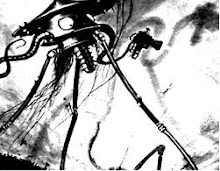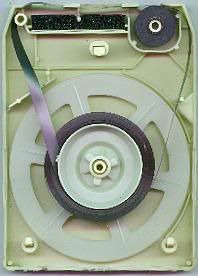You May Not Share Your Culture
During the first week of April, I discovered the website Muxtape.com. The site allows people to create free accounts to put together online “mix tapes” to share with others. Muxtapes are limited to 12 songs, and users are not allowed to upload more than one song from a single release or artist or have multiple muxtapes. Muxtapes are not available for download and all submitted songs are accompanied with a link to Amazon.com’s mp3 downloads section. I thought that this website was a great compromise between music fans who want to share music via the internet and a music industry that is increasingly hostile to such sharing. I also just wanted the chance to make my own virtual mix tape to share with other people!
One of the songs that I selected for my first muxtape was from the mostly unknown Philadelphian band FNU Ronnies, titled, “Silver Bullet.” I had only first heard about the band a week prior from a close friend, but was nonetheless impressed with the song. I recorded the streaming audio on my computer as the song played on the band’s Myspace page, much the same way I used to make cassette tapes from songs recorded from radio. Up went the song onto my muxtape.
A little more than two weeks later I got an email inquiring about the song. The author of the email wanted to know how to get a copy -- I only mentioned that I had recorded the song from Myspace, as I was still waiting for my copy of FNU Ronnie’s debut 7” from Parts Unknown Records. About a week after responding to the email, I received a strange comment on my blog. The post was about Yoko Ono’s lawsuit against the producers of the anti-science film Expelled for their use of John Lennon’s “Imagine.” In the post, I discussed the copyright issues involved. The comment on this post asked me how I felt about individuals “illegally trying to sell” music “ripped on the internet”; a strange comment, considering its lack of relevance to the post. That tipped me off to search around for information about the commenter.
After a short Google search, strong circumstantial evidence led me to believe that the comment came from FNU Ronnies, as did the email I had received a week prior. This turn of events puzzled me. My experiences with music subcultures, specifically those rooted in punk rock, have given me an anti-copyright impression. Many of the bands I have known and have been involved with never considered actually copyrighting music. Labels I have known and have been involved with were never concerned with file-sharing or lost sales. Furthermore, my close friend who introduced me to FNU Ronnies informed me that the debut 7” is nearly sold out. Clearly, my inclusion of “Silver Bullet” cannot be cutting into sales, right?
I must admit, though, that this all is likely to have been in jest. FNU Ronnies is a part of a new musical movement -- Skull music -- which combines early ‘80s American hardcore (YDI, Black Flag) with the strange-yet-hard-sought-after punk classics (Mentally Ill, The Eat, Remo Voor) released on the Killed by Death (fan music blog link) record label. Self-described Skull bands, such as Clockcleaner and Homostupids, engage in a sort of confrontational performance art along with their music. Clockcleaner’s Nevermind album (a re-appropriation of Nirvana's second album title) was named as such to enrage listeners -- guitarist and vocalist John Sharkey stated in an interview with Dusted Magazine, “I kind of wanted people to react like, ‘What balls! Who the fuck are these assholes?’” The fun doesn’t stop there, either: legend has it that Sharkey pissed all over the merch of rival band Bad Wizard at one show and intentionally knocked over a kid with cerebral palsy at another performance (I know; I was there). So my confrontation with FNU Ronnies is likely to be a part of the Philadelphian humor; however, the incident did get me thinking further about copyright issues.
Sites like Muxtape allow people to share music (hopefully) without the fear of a “Cease and Desist” letter from their ISP or a lawsuit from the RIAA. I was a bit shocked that an artist would take offense from a fan putting one of his/her songs on a muxtape for other people to hear. My intentions had been to share the music that really resonates with me. That’s how I’ve almost always discovered new sounds -- someone I knew made me a copy of some new music and gave it to me for listening. This is classic mouth-to-mouth advertising, arguably the best advertising one can get.
There is one critical difference, in the eyes of the industry, between mix tapes/CD-Rs and digital file-sharing -- scale. Sharing music online is easier and faster than sharing has ever been. But how different is a site like Muxtape from a radio broadcast? What about a Myspace music page? Why are these digital streams viewed as different from their analog counterparts?
What are Muxtape and a Myspace music page, ultimately? They are both platforms for distributing music digitally. Instead of a corporate, computer generated play list that is simulcast throughout tens -- even hundreds -- of radio stations, fans and artists are put in the DJ seat. Those who enjoy the culture of their music are participating in that culture by sharing it with others. In other words, they are in a position of control at the individual level of the culture they enjoy.
And that is the difference -- control. Radio broadcasts happen on federally licensed airwaves. Only a select few have access to these avenues of distribution. The content providers have a vested interest in their distribution model succeeding because of the vast amount of resources spent. The internet appears to be the great equalizer in this equation -- it provides a democratic distribution model. Anyone, anywhere, can share music with anyone, anywhere. The music industry is used to being in control of their distribution model and now the industry is trying to apply that system of control to a distributed network based upon protocols. The end result of this is technological quick fixes that have no way to enforce a control model -- DRM (Digital Rights Management) and copy-protection is easily hacked, bypassed, and subverted.
What does this mean for the future of music and file-sharing? The music industry is already of the opinion that file-sharing is the equivalent of lost sales. The data on this varies by who you ask -- in 2004, a study conducted by Felix Oberholzer-Gee of Harvard University and Koleman Strumpf of the University of North Carolina concluded that file-sharing increased CD sales for top selling albums. The RIAA will point to research by Edison Media Research which claims that file-sharing has decreased CD sales; however, Jupiter Research conducted two studies (in 1999 and 2002) which concluded that music fans who shared music files for six months were 75 percent more likely than average online music fans to purchase more music. If file-sharers are the industry’s best costumers, how can they be the cause of a loss of sales?
Instead of attempting to circumvent possibly the best form of advertising being offered on a silver platter by fans, the music industry should embrace these technologies which can bring music to people’s ears faster than ever before. Music fans are so rabid about their favorite artists that the industry wouldn’t have to do much to promote those artists. But this is a risky new democratic model, as it could lead to super-smash hits being relegated to a lesser role and will remove the control the industry has relied upon to make low-risk investments in new artists. But couldn’t such risk stimulate an environment that feeds off of creativity and innovation, rather than following a tried-and-true model?



No comments:
Post a Comment